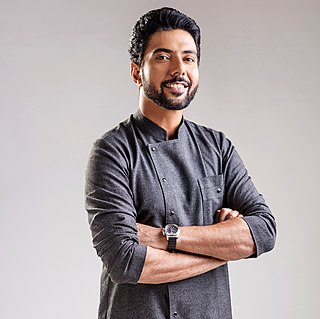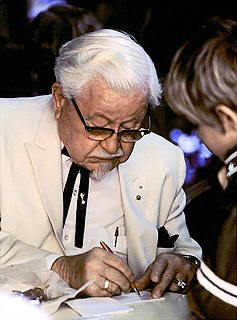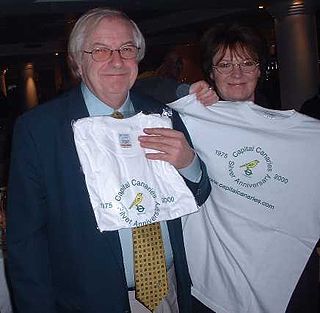Top 1200 American Food Quotes & Sayings - Page 2
Explore popular American Food quotes.
Last updated on September 20, 2024.
Food can be utilized for economic reasons, like the grain embargo of Carter 40 years ago. You have a political decision, you are going to move the flow of food in a part of the world and not another part of the world. And certainly now, with the way the country is polarized and all that, you wouldn't want to have a French menu, with a French thing - you'd be crucified! Or anything like that. You have to be a real American and apple pie and this and that.
Bad food is made without pride, by cooks who have no pride, and no love. Bad food is made by chefs who are indifferent, or who are trying to be everything to everybody, who are trying to please everyone. Bad food is fake food, food that shows fear and lack of confidence in people's ability to discern or to make decisions about their lives.
I spend so much money on food, just getting the food for me is a tremendous expense, so there's no way I could even think about paying for supplements. I think of all supplements as food derivative anyway, so If I can only choose between getting the food or the supplements I'd rather opt for the food.
Personally, I have been very impressed by the slow food movement. It is about celebrating the culture of food, of sharing the extraordinary knowledge, developed over millennia, of the traditions involved with quality food production, of the sheer joy and pleasure of consuming food together. Especially within the context of family life, this has to be one of the highest forms of cultural activity.
In studying food, you embrace everything. Food exposes the long, complex history of the South - slavery, Jim Crow segregation, class struggle, extreme hunger, sexism, and disenfranchisement. These issues are revealed through food encounters, and they contrast this with the pleasure and the inventiveness of Southern cuisine. Food is always at the heart of daily life in the South.
When I'm asked to define "Southern food," I usually turn that question back to my audience and ask them what they think. I hear responses like fried chicken, catfish, barbecue, collard greens, and sweet potatoes. These are excellent examples, because they are historically grounded. You can trace each dish back to the people who brought these food traditions to the South. Today, these foods are central to the core culinary grammar of the American South.
Let’s get one thing straight: Mexican food takes a certain amount of time to cook. If you don’t have the time, don’t cook it. You can rush a Mexican meal, but you will pay in some way. You can buy so-called Mexican food at too many restaurants that say they cook Mexican food. But the real food, the most savory food, is prepared with time and love and at home. So, give up the illusion that you can throw Mexican food together. Just understand that you are going to have to make and take the time.
The strongest argument for the un-materialistic character of American life is the fact that we tolerate conditions that are, from a materialistic point of view, intolerable. ... No nation with any sense of material well-being would endure the food we eat, the cramped apartments we live in, the noise, the traffic, the crowded subways and buses. American life, in large cities, at any rate, is a perpetual assault on the senses and the nerves.
I think Americas food culture is embedded in fast-food culture. And the real question that we have is: How are we going to teach slow-food values in a fast-food world? Of course, its very, very difficult to do, especially when children have grown up eating fast food and the values that go with that.
Food is "everyday"-it has to be, or we would not survive for long. But food is never just something to eat. It is something to find or hunt or cultivate first of all; for most of human history we have spent a much longer portion of our lives worrying about food, and plotting, working, and fighting to obtain it, than we have in any other pursuit. As soon as we can count on a food supply (and so take food for granted), and not a moment sooner, we start to civilize ourselves.
Let me get a sip of water here... you figure this stuff is safe to drink? Actually, I don't care, I drink it anyway. You know why? Because I'm an American and I expect a little cancer in my food and water. I'm a loyal American and I'm not happy unless I let government and industry poison me a little bit every day.
Isn't food important? Why not "universal food coverage"? If politicians and employers had guaranteed us "free" food 50 years ago, today Democrats would be wailing about the "food crisis" in America, and you'd be on the phone with your food care provider arguing about whether or not a Reuben sandwich with fries was covered under your plan.
We domesticated pigs to turn food waste back into food. And yet, in Europe, that practice has become illegal since 2001 as a result of the foot-and-mouth outbreak. It's unscientific. It's unnecessary. If you cook food for pigs, just as if you cook food for humans, it is rendered safe. It's also a massive saving of resources.
I think America's food culture is embedded in fast-food culture. And the real question that we have is: How are we going to teach slow-food values in a fast-food world? Of course, it's very, very difficult to do, especially when children have grown up eating fast food and the values that go with that.
Secretly in my heart, I believe food is a doorway to almost every dimension of our existence. ... Food never was just food. From the time a cave person first came out from under a rock, food has been a little bit of everything: who we are spiritually as well as what keeps us alive. It's a gathering place, and in the best of all worlds it's possible that when people of one country sit down to eat another culture's food it will open their minds to the culture itself. Food is a doorway to understanding, and it can be as profound or as facile as you would like it to be.
Somewhere between 50 to 60 percent of the food you eat has been touched by immigrant hands, and it is fair to say some of them are not here as they should be here. But if you didn't have these folks, you would be spending a lot more - three, four or five times more - for food, or we would have to import food and have all the food security risks.
Food historian Jessica B. Harris says African American cuisine is simply what black people ate. When I think about what my family ate, we ate what people think of as soul food on special occasions, on holidays, but our typical diet was leafy greens and nutrients and tubers - food that was as fresh as being harvested right before our meal. Whatever was in season, that's what we were eating. It was being harvested right from our backyard.
Bad food is made without pride, by cooks who have no pride, and no love. Bad food is made by chefs who are indifferent, or who are trying to be everything to everybody, who are trying to please everyone... Bad food is fake food... food that shows fear and lack of confidence in people's ability to discern or to make decisions about their lives.
















































